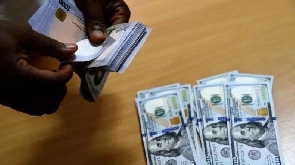Nigeria’s central bank has taken another step to improve liquidity in the foreign-exchange market, removing restrictions on dollar deposits at local banks a week after devaluing the naira and allowing it to trade more freely.
Limits on the amount of dollars depositors could place and hold with local banks were introduced in 2021 in a move the central bank said was aimed at preventing speculators form hoarding foreign currency. It exacerbated a shortage of hard currency and bolstered a black market for dollars and transactions outside of the formal economy.
Removing the cap on deposits, together with other measures to liberalize the foreign-exchange market, would improve the supply of dollars, enhance customer confidence and ensure more stability in the market, the Central Bank of Nigeria said in an emailed statement following a meeting with the heads of the country’s lenders. Deposits were limited to $10,000 at a time up to a maximum of $20,000.
“Cash deposits into domiciliary accounts will not be restricted,” subject to banks carrying out due diligence on customers, the central bank said. “Domiciliary account holders shall have unfettered and unrestricted access to funds in their accounts.”
The Nigerian central bank has scrapped the country’s multiple exchange-rates regime, which cut off access to hard currency for many businesses and individuals, forcing them to the unauthorized black market. Last week, it devalued the naira by allowing it to trade more freely, and adopted the so-called importers and exporters window as the single official exchange rate.
The latest measure means “domiciliary account holders can sell their dollars to banks and the banks in turn can use it to fund obligations,” boosting market liquidity, said Abdulazeez Kuranga, a macroeconomic strategist at Lagos-based Cordros Capital Ltd.
The regulator assured lenders’ chief executives at the meeting that it will prioritize the settlement of foreign-exchange forward transactions as they fall due in order to boost market confidence. It didn’t completely remove exchange controls, saying that account holders could use up to $10,000 a day for transactions.
Still, partially removing the restrictions, “could over the next few months enhance the supply of foreign exchange and increase government control over available foreign currency balances,” in the country, said Mosope Arubayi, an economist at IC Group.
Business News of Tuesday, 20 June 2023
Source: Bloomberg













